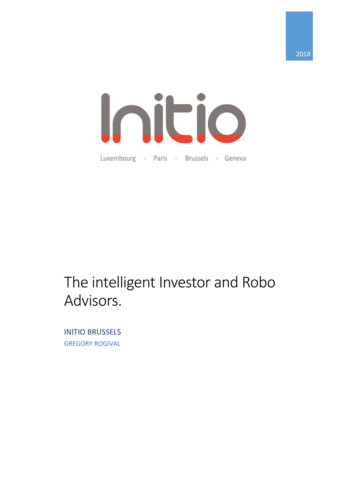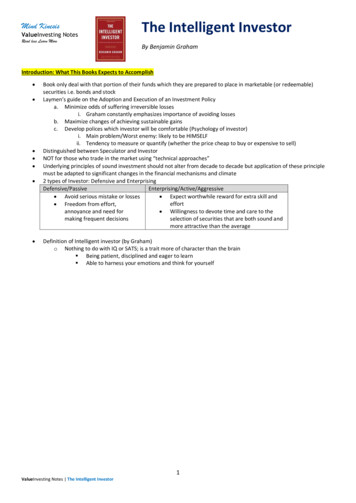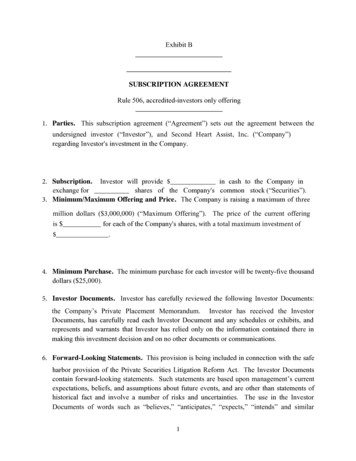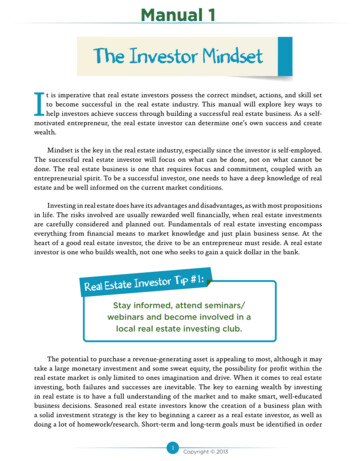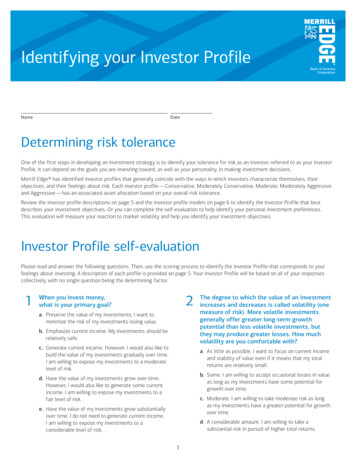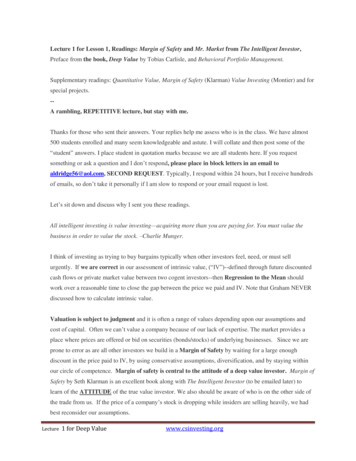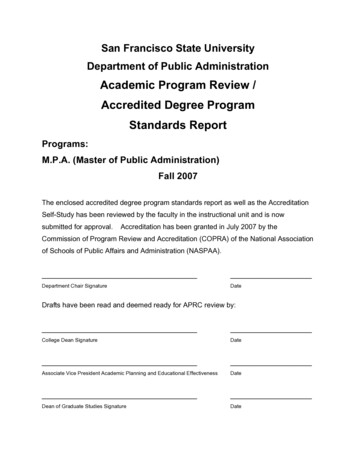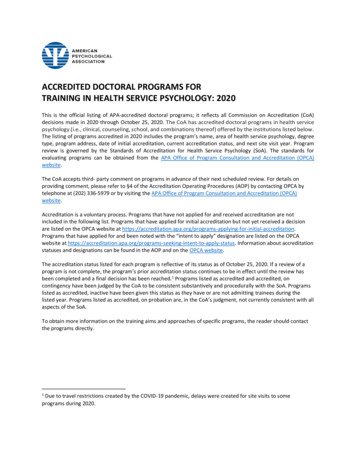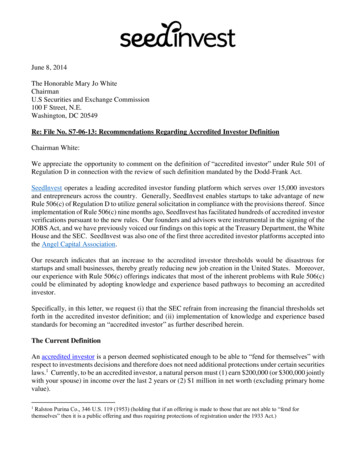
Transcription
June 8, 2014The Honorable Mary Jo WhiteChairmanU.S Securities and Exchange Commission100 F Street, N.E.Washington, DC 20549Re: File No. S7-06-13: Recommendations Regarding Accredited Investor DefinitionChairman White:We appreciate the opportunity to comment on the definition of “accredited investor” under Rule 501 ofRegulation D in connection with the review of such definition mandated by the Dodd-Frank Act.SeedInvest operates a leading accredited investor funding platform which serves over 15,000 investorsand entrepreneurs across the country. Generally, SeedInvest enables startups to take advantage of newRule 506(c) of Regulation D to utilize general solicitation in compliance with the provisions thereof. Sinceimplementation of Rule 506(c) nine months ago, SeedInvest has facilitated hundreds of accredited investorverifications pursuant to the new rules. Our founders and advisors were instrumental in the signing of theJOBS Act, and we have previously voiced our findings on this topic at the Treasury Department, the WhiteHouse and the SEC. SeedInvest was also one of the first three accredited investor platforms accepted intothe Angel Capital Association.Our research indicates that an increase to the accredited investor thresholds would be disastrous forstartups and small businesses, thereby greatly reducing new job creation in the United States. Moreover,our experience with Rule 506(c) offerings indicates that most of the inherent problems with Rule 506(c)could be eliminated by adopting knowledge and experience based pathways to becoming an accreditedinvestor.Specifically, in this letter, we request (i) that the SEC refrain from increasing the financial thresholds setforth in the accredited investor definition; and (ii) implementation of knowledge and experience basedstandards for becoming an “accredited investor” as further described herein.The Current DefinitionAn accredited investor is a person deemed sophisticated enough to be able to “fend for themselves” withrespect to investments decisions and therefore does not need additional protections under certain securitieslaws.1 Currently, to be an accredited investor, a natural person must (1) earn 200,000 (or 300,000 jointlywith your spouse) in income over the last 2 years or (2) 1 million in net worth (excluding primary homevalue).Ralston Purina Co., 346 U.S. 119 (1953) (holding that if an offering is made to those that are not able to “fend forthemselves” then it is a public offering and thus requiring protections of registration under the 1933 Act.)1
A Large Increase in the Accredited Investor Dollar Thresholds would be DisastrousWe understand that the Commission is considering whether to increase the foregoing financial thresholds.We believe this would be disastrous. Analysis by the General Administrative Office (GAO) of federaldata on household net worth showed that adjusting the 1 million minimum threshold to approximately 2.3 million, to account for inflation, would decrease the number of households qualifying as accreditedfrom approximately 8.5 million to 3.7 million.2The U.S. Startup Funding Ecosystem is the Envy of the WorldThe American startup funding markets are the envy of the world -- global talent and capital flock to US startups.Communities around the world are trying to replicate Silicon Valley in their own countries. Moreover, angelinvestor communities are not only active in Silicon Valley, but also in communities across the country (both ruraland urban) here at home, including active groups like the Upstate Carolina Angel Network (Greenville, SC) andNew Mexico Angels (Albuquerque, NM). According to the Angel Capital Association, nearly “one-third of ACAMembers in [areas outside of the major tech centers] would no longer qualify [as accredited investors].” The lossof this capital in these areas where traditional venture capital is limited would be devastating to economic growthin these communities across the country.The Stakes are High“According to the Center for Venture Research, 70,730 entrepreneurial ventures received angel fundingin 2013 Kauffman Foundation research has established that were it not for new businesses, there wouldbe no net job growth in the U.S. Economy.”32GAO Report to Congressional Committees, GAO‐13‐640 Accredited Investor Study, July 2013.See Comment Letter from Kauffman Foundation to the Securities and Exchange Commission (July 2, 2014, available pdf)3
Furthermore, according to a just released report by the European Trade Association for Business Angels,“on average, the employment rate more than triples” for companies that take on angel investments.“While the average number of employees was five at the time the first angel investment, this figure grew231% by year three when on average the same companies employed 16.7 people.”4Bottom Line: Angel funded companies hire often and aggressively for high quality jobsAn increase in the accredited investor thresholds would substantially disrupt the startup fundingecosystem, destroying jobs and the U.S.’s competitive advantage. Ultimately, such a change could leadto a stagnated U.S. economy, diverting talent and capital to other parts of the world.No Tangible Benefit to IncreaseAt the core of any policy decision is a cost-benefit analysis. We have not seen any evidence that anincrease to these thresholds would have any substantial positive effect on investor protection.According to the GAO, investor and industry associations say that “any changes to the thresholds mightprovide only marginal increases to investor protection” and that “increasing the thresholds would limitcapital formation.”4See The Economic Impact of Angel Investment, July 1, 2014, available at -angel-investment/?utm source EBAN Subscribers&utm campaign ff8fdd33a2EBAN Flash July 2014&utm medium email&utm term 0 a77c25eb47-ff8fdd33a2-299671285#.U7w5T7FBkgt
The Wrong MetricsMoreover, the definition of accredited investors relies solely on financial metrics and fails to consider anyof the other relevant factors to determining sophistication. For example, consider that the following peopleare probably not accredited investors (i.e. deemed by the government to not be sophisticated enough toprotect themselves): A U.S. Congressman (the annual salary 174,000)An experienced securities lawyer (outside of major markets of NY, SF, LA, CHI etc.)Average Harvard Professor ( 151,262)Federal District Court Judge ( 186,000)A licensed stock broker ( 131,000)Some of these people are charged with protecting other members of the public, yet they are not deemedto be able to protect themselves.The definition is fundamentally flawed in assuming that a person’s wealth or income determines theirfinancial sophistication and whether they are, in the words of the U.S. Supreme Court, able to “fend forthemselves.”5 A person’s experience, knowledge and credentials should also be determinative of theirneed for protection from the government, not how much money they have.Unequal Treatment under the LawAdditionally, a pure financial standard does not treat all citizens equally. It ignores cost of livingdiscrepancies across the country. 200,000 in New York City is a lot different than 200,000 in Houston,TX. The standard disproportionately excludes people in lower cost of living areas. People in Houston inthe same financial condition should have the same opportunities to invest in startups as people in NewYork. Even more stark, the joint marriage threshold (i.e. 300,000 jointly for married couples)inappropriately excludes certain same sex couples.People falling outside of the “accredited investor” definition are not allowed to invest in any privatecompanies. Thus, the current definition of accredited investor disproportionately affects individuals inlower cost-of-living areas or same-sex couples (in civil unions or domestic partnerships) by prohibitingtheir participation in the wealth creation occurring in the private markets (see WhatsApp: acquired for 19billion without ever touching the public markets).The ultimate goal here should be to refine the accredited investor definition (i) so as to treat people fairlyand equitably based on metrics more indicative of financial sophistication and (ii) such that is based onpublicly available or non-sensitive information so that people will be comfortable verifying theiraccredited investor status.The only way to treat people equally under the law is to adopt knowledge and experience basedstandards.5Ralston Purina Co., 346 U.S. 119 (1953)
Knowledge and Experience Based Standards should PrevailHere are some proposed categories of people who should be deemed able to “fend for themselves” andtherefore should be included in the accredited investor definition: Passing a Test. Individuals who pass a standardized accredited investor test with publiclyavailable test results. Advanced Degrees. Individuals holding an advanced degree in business/law related fields (i.e.MBA, J.D., Masters or PhD in Finance, Economics, Business, etc.) Professional Designations. Individuals with Professional Designations (i.e. J.D., CPA, CFA,CISP, etc.) Securities Licenses. Individuals who hold Securities Licenses (Series 7, Series 63, etc.) Acting through Registered Investment Advisor or Broker-Dealer. An individual who hasconsulted a licensed expert and acts in accordance with their recommendations should be deemedto be able to “fend for themselves.” By Order of a Court, the Commission, a State Securities Administrator or othergovernmental entity. An established governmental authority should be able to determine that aperson is capable of fending for themselves with respect to investments. This would allow formore of a real-world practical approach to the application of the definition.These items are far more likely to indicate financial sophistication versus a blanket financial threshold.Individuals may have acquired wealth by inheritance or may have saved their entire lives to accumulate 1M in net worth. Those individuals are no more likely to be sophisticated than, for example, a personwith an MBA degree.Experience under newly enacted Rule 506(c) of Regulation DThere has been a lot of uproar about new rules requiring additional steps to verify accredited investorstatus (i.e. checking tax returns) as a condition to using the new 506(c) rules permitting generalsolicitation.Again, the real problem here is that the definition of accredited investor is out of touch with reality andis based on very sensitive personal financial information without any real rationale.Because the test is based on this sensitive financial information, it adds unnecessary friction to theinvesting process. Most people are reluctant to turn over tax returns or net worth or brokerage statements.As a result, far fewer startups are taking advantage of Rule 506(c) than would otherwise be the case, thuslimiting the rule’s intended effect on job creation.66See, Keith F. Higgins, Director, Division of Corporation Finance, Keynote Address at the 2014 Angel Capital AssociationSummit, indicating 10B raised using 506(c) vs. 922B raised using 506(b) between September 2013 and April 2014,available at 41320533#.U7srHLFBkgs.
At SeedInvest, we’ve facilitated hundreds of accredited investor verifications under Rule 506(c) using ouronline, automated accredited investor verification process. Using our system, an investor can easily allowus to pull electronic tax records from the IRS, email their lawyer/accountant for a verification or use ouronline wizard to upload the necessary documents for verification.While many verifications have been processed smoothly, the strictness of this rule has led to someconfusion and unintended consequences, including the following: Net Income Verification is very difficult in January – May of each year. Tax transcripts orrecords for a given year are not generally available until June of the following year. There are 5months every year where it is difficult to follow the net income safe harbor by reviewing tax returnsfor the previous 2 years. It is impossible to truly verify net worth. Verifying net worth requires verification of a person’soutstanding liabilities. It is practically impossible to conduct a comprehensive third partyverification of liabilities and therefore one can only rely on information provided by the investor.This makes such a third party verification illusory by its nature and not significantly better than anabsolute self-certification. Individuals are hesitant to provide personal financial information. The time and effortrequired to get over this hump will cost millions of dollars in time wasted and legal fees and willdissuade many potential accredited investors from participating in the private placement market. Renewing a third party verification every 3 months is extremely inefficient. With respect tonet income, a 3 month renewal is completely repetitive. With respect to net worth, the likelihoodof any substantial change within 3 months is negligible. The result is wasted time and money withno real benefit. An experienced securities lawyer was not allowed to invest because he “only” makes 150,000/year. No flexibility. A sophisticated fund manager, who earned 500,000 in year 1, 199,000 in year2, and an expectation of earning over 500,000 in the current year, was not allowed to invest. A parallel venture capital fund can be very difficult to verify. Parallel funds of big venturecapital funds are often under 5M in assets and therefore would require an issuer to verify everyindividual investor in the parallel fund. This is a nonstarter for most venture capital funds. Marriage within the last 3 years can frustrate accredited investor verification. The definitiondoes not allow for switching between the individual ( 200k) and married ( 300k) threshold tests. Asking about financial status leads to questions about sensitive personal issues like divorce(including division of assets) and death.
For entities with assets less than 5M, the “all equity holders are accredited investors”standard can require an endless amount of diligence. Very small ownership percentagestogether with unreachable equity holders can make verification of entities extremely difficult.We’ve witnessed this problem with an entity related to a very large and prominent universityendowment fund. Advisors Don’t Want to Incur Liability. Many lawyers, broker-dealers, certified publicaccountants, and registered investment advisors are reluctant to provide a third party certificationeven when they have personal knowledge due to liability and compliance concerns. The staffshould consider a safe harbor for these advisors where they have acted reasonably in good faith. Startups are still struggling with the definition of “general solicitation.” There is still greatuncertainty on what activities constitute “general solicitation.” Many startup do not know whetherthey should raise capital under Rule 506(b) or 506(c) and some have inadvertently ended up with506(c) offerings.All of these problems go away with an additional knowledge/experience based standard, which wouldcause much less friction and provide for greater accuracy on who needs protection. This woulddramatically increase the viability of Rule 506(c) and allow the rule to fulfill its original congressionalintent, namely to create jobs.SeedInvest’s Proposed Revised Accredited Investor DefinitionBased on the foregoing, we propose the following modifications to the definition of “accreditedinvestor” under Rule 501(d) of Regulation D:1. a bank, insurance company, registered investment company, business development company, orsmall business investment company;2. an employee benefit plan, within the meaning of the Employee Retirement Income Security Act,if a bank, insurance company, or registered investment adviser makes the investment decisions,or if the plan has total assets in excess of 5 million;3. a corporation, limited liability company, partnership, or charitable organization, corporation, orpartnership with assets exceeding 5 million;4. a director, executive officer, or general partner of the company selling the securities;5. an entity business in which all the equity owners are accredited investors;6. a natural person who has individual net worth, or joint net worth with the person’s spouse, thatexceeds 1 million at the time of the purchase, excluding the value of the primary residence ofsuch person;7. a natural person with income exceeding 200,000 in each of the two most recent years or jointincome with a spouse (or with a partner in a civil union or domestic partnership) exceeding 300,000, in each of the two most recent years for those years and a reasonable expectation ofthe same income level in the current year; or
8. a natural person who holds or who has held one of the following professional licenses:a. License to practice law in any state of the United States or foreign jurisdiction.b. Certified Public Accountant (CPA)c. Chartered Financial Analyst (CFA)d. Registered agents of registered broker-dealerse. Representatives of registered investment advisorsf. Series 7, 63, or 66 licenses9. a natural person who has received one of the following degrees from an accredited educationalinstitution:a. Masters of Business Administration (MBA)b. Masters or doctorate (PhD) in finance, economics, business or a related field of studyc. A Juris Doctor (J.D.);10. a natural person who is deemed to be an “accredited investor” in writing by order of a court, theSecurities and Exchange Commission, or a state securities administrator;8.11.a natural person who passes an accredited investor exam promulgated and sanctioned bythe Commission or its designee;9.12.a natural person purchasing the applicable securities based on the advice of a registeredinvestment advisor or registered broker-dealer; or10.13.a trust with assets in excess of 5 million, not formed to acquire the securities offered,whose purchases a sophisticated person makes.ConclusionIn light of the foregoing, we, on behalf of the thousands of investors and entrepreneurs in our network,respectfully urge the Commission to: Restrain from increasing the dollar thresholds of the accredited investor definition. Modify the definition to provide for additional knowledge and experience mechanisms tobecoming an accredited investor as described above.
We look forward to the ongoing conversation and welcome the opportunity to provide additional detailsor market data to the Commission and its staff.Respectfully,Kiran LingamDigitally signed by Kiran LingamDN: cn Kiran Lingam, o, ou,email kiran@seedinvest.com, c USDate: 2014.07.08 17:02:44 -04'00'Kiran Lingam, Esq.General CounselSeedInvest, LLCkiran@seedinvest.comwww.seedinvest.comcc:Ryan Feit, Chief Executive Officer, SeedInvestMarianne Hudson, Executive Director, Angel Capital AssociationRepresentative Patrick McHenry
and urban) here at home, including active groups like the Upstate Carolina Angel Network (Greenville, SC) and New Mexico Angels (Albuquerque, NM). According to the Angel Capital Association, nearly “one-third of ACA Members in [areas outside of the major tech centers] wou
